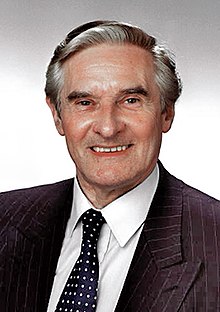Derek Foster, Baron Foster of Bishop Auckland
The Lord Foster of Bishop Auckland | |
|---|---|
 | |
| Shadow Chancellor of the Duchy of Lancaster | |
| In office 19 October 1995 – 2 May 1997 | |
| Leader | Tony Blair |
| Preceded by | Ann Taylor |
| Succeeded by | Michael Heseltine |
| Shadow Minister for the Citizen's Charter | |
| In office 19 October 1995 – 2 May 1997 | |
| Leader | Tony Blair |
| Preceded by | Ann Taylor |
| Succeeded by | Position abolished |
| Opposition Chief Whip of the House of Commons | |
| In office 23 October 1985 – 19 October 1995 | |
| Leader |
|
| Preceded by | Michael Cocks |
| Succeeded by | Donald Dewar |
| Member of the House of Lords Lord Temporal | |
| In office 16 June 2005 – 5 January 2019 Life peerage | |
| Member of Parliament for Bishop Auckland | |
| In office 3 May 1979 – 11 April 2005 | |
| Preceded by | James Boyden |
| Succeeded by | Helen Goodman |
| Personal details | |
| Born | Derek Foster 25 June 1937 Sunderland, England |
| Died | 5 January 2019 (aged 81) Sunderland, England |
| Political party | Labour |
| Alma mater | St Catherine's Society, Oxford |
Derek Foster, Baron Foster of Bishop Auckland, PC, DL (25 June 1937[1] – 5 January 2019) was a British Labour politician who served as Member of Parliament for Bishop Auckland, in County Durham, from 1979 to 2005.[1]
Political career
[edit]Foster was first elected to represent Bishop Auckland at the 1979 general election, and held this seat until his retirement in 2005. He served as opposition Chief Whip between 1985 and 1995, becoming a member of the Privy Council in 1993. After Tony Blair became leader in 1994, he was keen to appoint a new Chief Whip and asked Foster to stand aside, in return for the promise of a seat in the Cabinet if and when Labour returned to power. Foster eventually agreed and became Shadow Chancellor of the Duchy of Lancaster in 1995.
However, when Labour won the 1997 election, Foster was appointed to the relatively junior role of Parliamentary Secretary in the Cabinet Office, under David Clark. After giving the matter further thought, Foster stood down from the government after just two days, and later publicly accused Mr Blair of having broken his promise to him. He was eventually appointed chair of the Commons sub-committee on employment, becoming something of a thorn in the Government's side during Mr Blair's first term. However, the employment sub-committee was abolished in 2001 and he became a backbencher, retiring from the Commons at the 2005 general election.
He was appointed as a deputy lieutenant of County Durham in 2001, giving him the post-nominal letters "DL" for life. On 13 May 2005 it was announced that he would be created a life peer, and in June 2005 the peerage was gazetted as Baron Foster of Bishop Auckland, of Bishop Auckland in the County of Durham.[2] He died from cancer at a hospital in Sunderland on 5 January 2019, at the age of 81.[3]
Other interests
[edit]Foster was deeply committed to The Salvation Army, serving at the Sunderland Millfield Corps, whilst also a member of the Labour Friends of Israel Policy Council.
Arms
[edit]  |
|
References
[edit]- ^ a b Leigh Rayment's Historical List of MPs – Constituencies beginning with "B" (part 3)
- ^ "No. 57681". The London Gazette. 22 June 2005. p. 8113.
- ^ "Lord Foster dies at 81 - Corbyn leads tributes". The Northern Echo. Archived from the original on 7 January 2019. Retrieved 7 January 2019.
- ^ Debrett's Peerage. 2019. p. 2666.


 French
French Deutsch
Deutsch